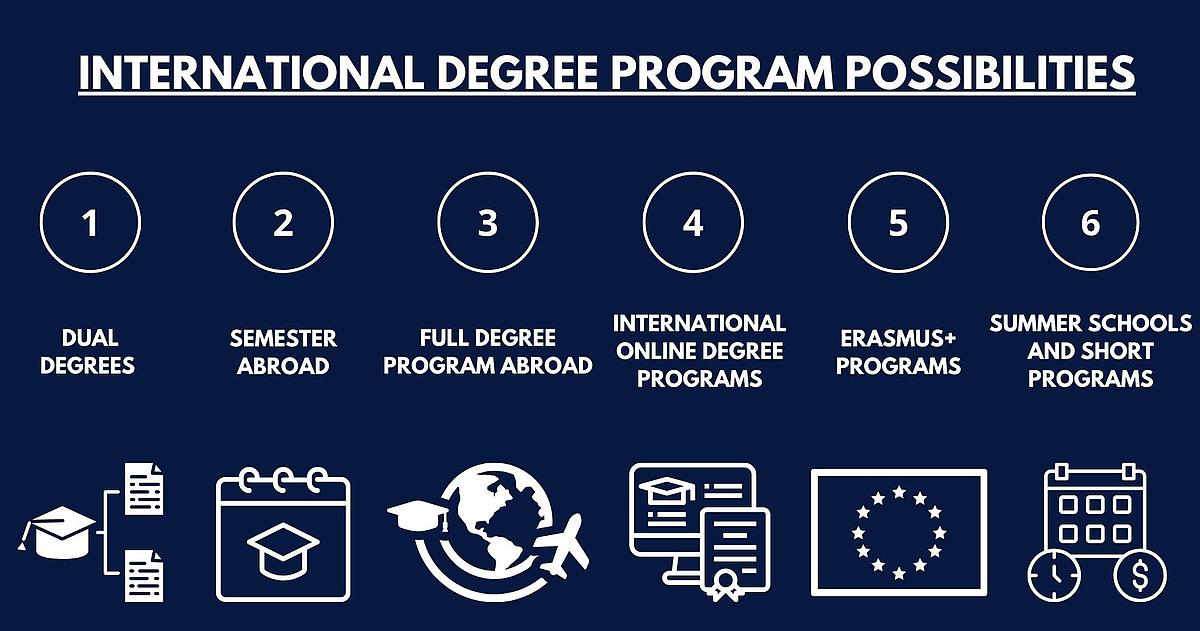This Website uses cookies to improve your visit on our website. More Info
International Degree Programs: Stepping Stone to a Global Career
International degree programs offer students the opportunity to complete part or even all of their studies abroad. They are ideal for those who want to gain a global perspective on their apprenticeship, experience new cultures and build valuable international networks. This article will help you understand the types of international degree programs available, the benefits they offer and what to look for when choosing a program.
International degree programs – a global perspective on studying
International degree programs offer you the chance to combine an academic apprenticeship with a global perspective. In an increasingly interconnected world, it is important to gain not only specialist knowledge but also intercultural skills and experience abroad. Such programs enable you to study in different countries, get to know different cultures and make valuable contacts.
Whether dual degrees, English-language programs or special exchange semesters – the possibilities are endless. Universities worldwide, particularly in Germany, offer specialized programs that will prepare you for an international career. Through collaborations with partner universities and companies abroad, you will gain practical insights and expand your language and cultural skills.
An international degree program not only allows you to develop academically, but also personally: you broaden your world view, learn to adapt in new environments, and develop the skills that are in demand in a global job market. Studying with a “world view” means equipping yourself for a future in which international cooperation and cultural diversity determine success.
DID YOU KNOW:
Munich Business School (MBS) is one of the leading private business schools in Germany and is known for its internationally oriented courses of study. MBS offers both bachelor's and master's programs taught in English that are specifically aimed at students who are pursuing global careers. Programs such as International Business, International Marketing and Brand Management or Sports Business and Communication, which all focus on a practical and intercultural apprenticeship, are particularly popular. MBS cooperates with over 60 partner universities worldwide and often integrates semesters abroad and international internships into its programs to offer students valuable international experience and networks. This makes Munich Business School an excellent choice for those looking to complete international degree programs and prepare for a career in a global environment.
International Degree Programs at MBS InformationAdvantages and disadvantages of an international degree program
This table summarizes the main advantages and disadvantages of an international degree program.
| Advantages | Disadvantages |
|---|---|
| Global career opportunities through international exposure. | Higher costs due to tuition fees, living expenses and travel. |
| Development of intercultural competence and cultural sensitivity. | Challenges of cultural adjustment and homesickness. |
| Improved language skills, especially in English or the local language. | More complex planning and organization, e.g. visa and accommodation. |
| Expansion of personal and professional network. | Possible difficulties in having qualifications recognized in the home country. |
| Experiencing new cultures and ways of life, which promotes personal maturity. | Distance from family and friends, which puts a strain on the social environment. |
International Degree Programs: What are the most common Degree Programs?
International degree programs offer a variety of opportunities to combine an academic apprenticeship with a global perspective. Here are the most common options:
Overview: International Degree Program Possibilities
The following graphic offers a brief overview of the international degree programs that many prospective students can choose from.

Explanation: International Degree Program Possibilities
The following diverse study opportunities offer students the chance to network globally, strengthen their intercultural skills and acquire valuable international qualifications.
Dual Degrees (Joint Degrees)
In these programs, students complete parts of their studies at two or more universities in different countries. At the end, they receive either two degrees from the participating universities (double degree) or a joint degree (joint degree).
Semester Abroad
Many universities offer the opportunity to study abroad for one or two semesters, often in cooperation with partner universities. These programs enable students to gain international experience without completing their entire degree program abroad.
Full Degree Program Abroad
Students can complete their entire studies at a foreign university. They often choose universities that have an international focus or are located in a country renowned for its academic programs.
International Online Degree Programs
With the rise of digital education, more and more universities are offering international online degree programs that allow students to study from their home country, anywhere in the world. These programs combine flexibility with access to global networks.
Erasmus+ Programs
This European exchange program allows students to study at universities within Europe. It provides financial support and helps to promote academic exchange between European countries.
Summer Schools and Short Programs
Many universities worldwide offer international summer or short-term programs. These often focus on specific topics and usually last only a few weeks, but they provide an intensive cultural and academic experience.
DID YOU KNOW:
Semesters abroad are planned in all international MBS degree programs. Internships that can be completed abroad are also an integral part of the plan. Even a dual degree with one of our numerous partner universities is supported at the Master's level.
More Information on this TopicRequirements for
international degree programs

Requirements for international degree programs
| Ability | Description |
|---|---|
| Intercultural competence | Ability to deal respectfully and openly with other cultures. |
| Language skills | Good knowledge of English, often also knowledge of the national language. |
| Flexibility and adaptability | Ability to adapt to new situations and challenges. |
| Independence and self-organization | Independent planning and organization of studies and life. |
| Openness to new experiences | Curiosity and willingness to embrace new experiences and perspectives. |
| Ability to work in a team | Effective collaboration with international teams. |
| Critical thinking and problem-solving skills | Analytical skills to solve global challenges. |
| Willingness to travel and sense of adventure | Enjoyment of traveling and exploring new places and cultures. |
| Time management | Good management of studies, travel and personal tasks. |
| Perseverance and resilience | Ability to overcome setbacks and remain strong in the face of adversity. |
International degree programs in Germany
Germany offers a wide range of international degree programs that provide students from all over the world with the opportunity to study in a multicultural environment. Here are some of the main features and opportunities for studying international programs in Germany:

- English-language degree programs: Many universities in Germany offer international degree programs in English. This enables students from non-German-speaking countries to study without language barriers. Master's programs in particular, but also some Bachelor's programs, are offered in English, especially in the fields of natural sciences, engineering, economics and social sciences.
- International double degrees: Some German universities offer international double degree or joint degree programs. These programs are created in collaboration with partner universities abroad and enable students to receive degrees from both universities. Such a program often requires studying abroad at the partner university.
- Erasmus+ exchange programs: Germany participates in the Erasmus+ program, which offers students the opportunity to study at European partner universities for one or two semesters. This is one of the most popular international mobility options in Europe and is supported by many German universities.
- German-French universities: A special example of bilateral cooperation is the German-French universities, such as the German-French University (DFH). Here, students can complete an intercultural course of study and study in both Germany and France.
- Studying at international universities in Germany: Germany is home to a number of international universities that are specifically geared to the needs of international students. One example is the Munich Business School, which offers degree programs taught entirely in English and has an international student body.
- Summer and exchange programs: Many German universities offer international summer courses or exchange programs that allow students from abroad to study at German universities for a short period. These programs often provide intensive language skills and cultural knowledge.
- DAAD and scholarship opportunities: The German Academic Exchange Service (DAAD) promotes international study programs in Germany and offers numerous scholarships for international students. These programs are designed to promote international exchange and to facilitate access to German universities for students worldwide.
Advantages of international degree programs in Germany:
- High quality education: German universities are known worldwide for their excellent academic apprenticeships.
- Low tuition fees: Many public universities in Germany charge only low or no tuition fees, making Germany an attractive study destination.
- Cultural diversity: International students benefit from an intercultural environment and get to know students from all over the world.
- Career prospects: Germany offers international alumni good opportunities to stay in the country and find work after graduation, especially in in-demand fields such as engineering, IT and natural sciences.
These factors make Germany a prime destination for international students seeking a high-quality, globally oriented academic apprenticeship.
German degree programs with an international focus
In Germany, there are a number of degree programs that are specifically geared towards internationality and prepare students* to succeed in a globalized world. These programs combine subject-specific knowledge with intercultural skills and often offer the opportunity to gain experience abroad. Here are some of the main degree options:
| International Business and Management | Degree programs such as International Business or Global Management prepare students for leadership positions in multinational companies. In addition to business fundamentals, students also learn how to deal with global markets and intercultural teams. Internships or semesters abroad are often an integral part of the curriculum. |
|---|---|
| Political science and international relations | Programs such as International Relations or Global Governance offer a well-rounded apprenticeship in political science topics with a global focus. Students deal with international conflicts, human rights, global security and international organizations. |
| Engineering and technology with an international focus | Degree programs such as Global Engineering or International Mechanical Engineering are aimed at students who want to work in globally networked engineering teams. In addition to technical skills, intercultural skills and international project management knowledge are also taught. |
| Cultural and linguistic studies with an international orientation | Programs such as Intercultural Communication, Global Studies or International Cultural Studies focus on the exchange between cultures. Students acquire in-depth knowledge of different cultural groups and develop language and communication skills for the international context. |
| Natural and environmental sciences with a global focus | In subjects such as environmental science or global sustainability, students deal with global ecological challenges. These courses of study often have a strong focus on international cooperation and the development of sustainable solutions for global environmental problems. |
| Medicine and health sciences in an international context | Degree programs such as global health or public health focus on global health issues and improving global health care. Students learn to analyze health challenges in different regions of the world and develop solutions at the international level. |
| Integrated stays abroad and intercultural programs | Many of these programs include mandatory or optional stays abroad. Students have the opportunity to study at partner universities worldwide or complete international internships to strengthen their intercultural and language skills. |
| Dual and English-language degree programs | Dual degree programs, offered in collaboration with foreign universities, enable students to obtain degrees from both universities. In addition, there are numerous programs offered entirely in English to attract international students and promote global exchange. |
Universities with highly international programs:
- Munich Business School offers internationally oriented Business Studies and Management programs at the Bachelor, Master, MBA & DBA levels.
- Freie Universität Berlin and Humboldt-Universität zu Berlin for international relations.
- Leuphana University Lüneburg for sustainability and environmental science.
International degree programs in Germany are an excellent choice for students* who want to broaden their world view and qualify for global careers.
If you are looking for more information, please feel free to visit the following advice pages:
Internship Abroad
Semester Abroad
Staying Abroad
Studying Abroad
How international studies work
International studies programs offer students the opportunity to combine academic apprenticeships with cultural experiences abroad. While the specifics of how an international studies program works may vary depending on the program and university, the process can generally be broken down into the following phases:

Applying for and selecting a degree program
The first step is to choose a suitable international degree program. Many universities offer special programs for international students, often taught in English. It is important to note the application deadlines and admission requirements, such as language certificates (e.g. TOEFL, IELTS) or qualifications. Some programs also require a letter of motivation or recommendation.
Preparation and organization
As soon as you have received your acceptance, you can start preparing for your studies abroad. This includes:
- Visa and residence permits: Depending on the country, students may need to apply for a student visa.
- Finding accommodation: Many universities offer places in halls of residence, but it is also possible to look for private accommodation.
- Insurance: In most countries, health insurance is compulsory, including for international students.
- Language courses: If studies are not conducted in one's own mother tongue or a familiar language, it is helpful to complete a language course.
Starting your studies and orientation
When you arrive in your host country, universities often offer orientation weeks to help international students get started. Here you will learn about:
- university procedures: how the teaching system works, how exams are organized and which facilities can be used.
- cultural adaptation: many universities offer intercultural training to prepare students for cultural differences.
- networking and social integration: international students can quickly make contacts through activities and events.
Studies and experiences abroad
During the studies themselves, there are some special features in an international context:
- Course selection and module structure: Students have to choose their courses, which are often a mixture of compulsory and elective modules. In international programs, there may be many options for setting individual priorities.
- Teaching methods: Teaching methods may differ from those at the home university. International degree programs often rely on interactive formats such as group projects, presentations or case studies.
- Internships and semesters abroad: Many programs offer internship opportunities or exchange programs at other universities. These experiences strengthen professional qualifications and expand international networks.
- Intercultural challenges: International students often have to adapt to new learning cultures and communication styles. However, these intercultural experiences are valuable for personal and professional development.
Degree and prospects
After successfully completing your studies, you will receive either a national degree, a double degree or a joint degree, depending on the program structure. Important aspects at this stage:
- Recognition of degrees: International degrees are recognized in many countries, but it makes sense to find out about specific recognition procedures in your home country.
- Professional networks: Many universities offer career counseling and events to support graduates in entering the job market. An international degree often opens up access to global job markets and facilitates applications to multinational companies.
After studies
Graduates of an international degree program have good chances on the job market, especially in professions with an international focus. In some countries, graduates can apply for a work permit to stay in the country and gain professional experience. Alternatively, many graduates use their intercultural skills to work in multinational companies or international organizations.
Studying abroad involves much more than just learning. It is a comprehensive experience that combines academic education, intercultural understanding and practical experience abroad. From the first application to daily life in the host country and the professional prospects after graduation – studying abroad not only shapes students academically, but also personally and professionally.
Career prospects with
international studies

Career prospects with international studies
| Career prospects | Description | Examples |
|---|---|---|
| Careers in multinational companies | Positions in global companies that require intercultural competence. | Marketing and sales, project management, business consulting |
| International organizations and NGOs | Careers in organizations such as the UN, World Bank or NGOs that require international connections. | Development cooperation, humanitarian aid, human rights |
| Diplomacy and foreign policy | Careers in the diplomatic service or in international negotiation delegations. | Embassies, consulates, international negotiation delegations |
| Education and research | Work in research and teaching, particularly in international relations and global issues. | Research in international relations, educational exchange programs |
| Tourism and hospitality management | Management and event organization in the globally connected tourism industry. | Management in international hotels, event management |
| Media and Communication | Careers in journalism, PR or marketing with an international focus. | Journalism, PR, media production |
| Start-ups and Entrepreneurship | Founding and managing start-ups that target international markets. | International start-ups, innovation management |
| Government and Non-Government Organizations | Working in politics and international projects, often in an advisory capacity. | Consulting on international issues, multilateral projects |
| Finance and International Banking | Careers in international banks, investment firms and financial institutions. | Investment Banking, Financial Management, Asset Management |
| Technology and Engineering | Technical jobs in global projects and research institutions. | Engineering projects, research and development, production management |
Studying internationally opens up a wide range of career prospects and improves your chances in the global job market. The skills that students acquire in an international degree program – such as intercultural competence, language skills and flexibility – are in high demand in many fields. An international degree not only broadens your horizons, but also creates excellent professional prospects in a globalized world of work. Graduates of these programs are particularly well prepared for The combination of academic knowledge, intercultural competence and global networks opens up a wide range of career opportunities.
International degree programs at Munich Business School
Munich Business School (MBS) offers a range of degree programs with a strong international focus. The main programs include:
- Bachelor in International Business: A seven-semester program that provides comprehensive knowledge of international business administration and prepares students for a global career.
- Master in International Business: A three-semester full-time program that enables students to deepen their knowledge of business administration, complemented by a strong international focus and the opportunity to complete a semester abroad.
- Master in International Marketing and Brand Management: Here you will learn how to manage and develop international brands in the digital age and develop the skills to succeed in a global marketing environment.
- Master in Innovation and Entrepreneurship: For those interested in start-ups or innovation management, this program offers practical insights into how to found and manage companies.
- Master in Finance: A three- to four-semester program that prepares you for a career in the financial sector. You will learn the basics of Financial Management and how to operate successfully in a global financial environment.
- Master in Sports Business and Communication: This program combines sports management and communication and prepares you for careers in the sports industry, with a focus on sports marketing and events.
- MBA General Management: A three-semester MBA program that prepares future managers for international management roles.
All programs at MBS are practice-oriented and have a strong international focus, with a particular focus on global networking and intercultural competence.
What makes MBS's international degree programs special?
The MBS International Business Bachelor's program is not only much more than just learning specialist knowledge, but also a forward-looking program. If you want to study international business in a holistic context, then you've come to the right place. Our lecturers will support you throughout your Bachelor of Arts in International Business, helping you to become a responsible business person who not only has professional expertise but also essential soft skills, broad cultural understanding and a strong personality.
Our Bachelor in International Business is characterized by its compact structure. It takes six to seven semesters to complete and concludes with a bachelor's thesis. You will complete at least three internships during your studies, both in Germany and abroad, and you will spend one or two semesters abroad putting your theoretical knowledge into practice and expanding your international network.
You can either study this program bilingually in the Bilingual Track (70% German/30% English) or completely in English in the English Track (100% English) to prepare you for global challenges.
We firmly believe that success will only come to those who see international business and management in a holistic context, taking into account social developments, political, historical and global interrelations.
With a Master's in Business Studies from Munich Business School, you will increase your career opportunities on the labor market and become a sought-after specialist and manager in the field of business administration. Thanks to the innovative teaching and contacts with companies, you will be ready for the economic challenges in the national and international environment. At Munich Business School, you can study Business Administration and be well prepared for your career.
We live and breathe internationality, and that makes studying Business Studies at Munich Business School an international experience. That is why staying abroad is an integral part of our Master's programs. With over 60 partner universities worldwide, the world is your oyster.
In the Master International Business, you will not only deepen your knowledge of economics and expand your knowledge in topics such as marketing, management and finance, but you will also train to become a specialist through the individually selectable specializations: Sustainable Business, International Marketing, International Finance, Luxury Management, Global Family Business, Innovation and Digital Business and International Entrepreneurship.
If you are interested in studying international brand management and at the same time want to gain comprehensive insights into the tasks of a marketing expert, the Master's program in International Marketing and Brand Management at MBS is the ideal choice for you! Our program will help you deepen your expertise in international marketing and brand marketing. You will gain insights into behavioral psychology, work with digital marketing tools, and learn about the latest innovations to strengthen your skills in understanding customers. This is a key aspect of success in the business world.
Our “theory meets practice” approach allows you to learn current scientific findings and apply your knowledge in real projects. By developing your own brand management campaigns and interacting with business professionals, you will be optimally prepared for your future career. During your International Marketing and Brand Management Master's studies, you can choose an international focus each semester and explore different markets, methods and special economic areas that influence the global economy.
The specialized curriculum of the master's program is designed to optimally prepare you for a successful career in a variety of fields. You will learn in small groups to develop your own business ideas, create business plans and found, manage and scale a start-up. The focus is not only on theoretical aspects, but also on practical projects in close collaboration with innovative companies. The comprehensive knowledge you gain in identifying, managing and implementing innovations will enable you to operate successfully internationally and develop creative solutions to current problems.
The core modules of the Master's programs provide a solid business education. Courses on topics such as international management, business communication, responsible leadership and your freely selectable international focus give you an understanding of economic interrelationships in a multicultural and globalized world. Emphasis is placed not only on theoretical knowledge, but also on promoting critical thinking and the application of practical methods and models. The interdisciplinary orientation of the core modules gives you the opportunity to exchange ideas with students from other master's programs and to work on joint projects.
The elective modules allow you to hone your profile with courses you have personally selected. Whether you choose courses on topics such as social entrepreneurship, technology trends or “Success Factor Happiness”, this is where you can customize your master's in innovation and entrepreneurship and, for example, take part in research projects.
The challenging Master's program at Munich Business School compellingly combines the core skills of the business and finance world. Here you will acquire a wide range of competencies in both the corporate strategy and management and the finance domains. You will build extensive expertise in corporate valuation, corporate finance and international finance while also gaining the necessary skills to take on responsible management positions. After completing the Master in Finance program, you will be able to confidently work as a specialist in Financial Management, analyzing financial statements, mergers and acquisitions, risk management, capital markets and much more.
Our approach to teaching places a strong focus on practical apprenticeship. During your studies, you will benefit from our MBS faculty, who are all actively involved in the business world and draw from their extensive experience. Through their direct insight into the economy, their industry knowledge and their knowledge of current research results, they will provide you with the skills needed to successfully tackle complex business challenges in the future and make informed decisions.
The Master's program in Sports Management at MBS is a one-and-a-half-year program aimed at graduates of a Bachelor's program and focuses on advanced topics in the field of sports management. The Master's program includes courses in sports marketing, sports economics, sports law and other related topics. In addition, students are given the opportunity to gain practical experience through internships and projects in the sports industry.
The sports management program at MBS is taught in English and offers students the opportunity to study in an international environment and network with other students from around the world. In addition, MBS has strong relationships with various leading sports organizations and companies, which provide students with access to internship and job opportunities.
Overall, the sports management program at MBS offers students a wide range of academic courses and practical experiences that prepare them for a career in the dynamic and exciting world of sports. Moreover, trends in the sports world, such as e-sports, fantasy sports, and virtual reality, are addressed in the sports management program. On our blog, for example, an MBS alumnus explains how he rose to become managing director of an e-sports and gaming consultancy after his sports management studies.
The MBA General Management is specifically tailored to the demands of today's globalized world. It enables you to deepen your knowledge of business administration and management, while strengthening and developing your leadership and interpersonal skills. In addition to a comprehensive curriculum, Munich Business School offers many other advantages. You will have the opportunity to study in a diverse environment and expand your professional network. Each semester begins with a six-day Welcome Week, which includes team-building events, intercultural training and networking meetings to get you off to a flying start.
An MBA study program at Munich Business School not only meets the standards of conventional MBA programs, but also offers further advantages. The contents of the MBA General Management program are based on different areas of focus: In the core subjects of Responsible Leadership, Innovation & Entrepreneurship and Global Management, business topics are covered, taking into account the innovative, responsible and cosmopolitan values of the university. This makes the MBA program at Munich Business School a unique learning experience. In the Expert Business Knowledge courses, students acquire comprehensive management know-how. Three specialized topic weeks, in which new topics are explored and intensive collaboration with fellow students takes place, round off the MBA General Management. Soft skills, networking and international experiences are also an integral part of the program. The university maintains excellent relationships with the business world, offering numerous opportunities to expand professional networks through practical projects with real companies and recruiting events. In addition, students receive individual career and personality coaching. Through membership in the EMBA Consortium, MBA General Management students and graduates also have the opportunity to spend a week at an international business school – for example, in Japan, Italy or the United States – and network with MBA students from around the world.
FAQ
Munich Business School is considered one of the best universities for international business because it has a strong international focus and offers excellent connections to global companies. Its courses are taught in English, are practical and designed to develop intercultural skills. In addition, the university promotes international experience through exchange programs and internships abroad, which makes it particularly attractive for a career in global business.
You should study International Management because it gives you the skills to succeed in a globalized economy. You will learn how to operate in international markets, bridge cultures, and lead global teams – opening many doors in multinational companies and expanding your career opportunities worldwide.
With an International Management degree, you can work in various fields such as marketing, sales, business consulting or project management in multinational companies. It prepares you for leadership positions in global companies and opens doors to careers in business, finance or international organizations.
Yes, international business definitely has a future, as globalization continues to advance and companies operate in a globally networked manner. Specialists who understand international markets and think globally are more in demand than ever and will continue to have many career opportunities in the future.
The difference is that international business focuses on global trade, markets and business strategies, while international management is more geared towards the management and organization of international teams and companies. International management is more concerned with intercultural cooperation and leadership, while international business is more focused on trade and economics in an international context.
Interested in a study program? Request our information material now!
More exciting degree programs in Munich













